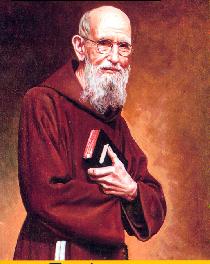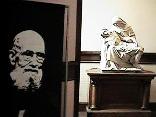
Story by the Fr. Solanus guild
|
|

Story by the Fr. Solanus guild
| FR.
SOLANUS CASEY |
Many times it has been said that Father Solanus has a message
for our times. That Message comes through not only in his letters and writings
but even more so in the study of his life and virtues. The most important
study has been the "Positio" otherwise known as the brief, prepared for
the Congregation for the Causes of Saints. It was from this official document
that they were able to base their decision about Father's heroic practice
of virtue - the very hallmark of holiness.
In the near future this three-volume work will be published in a one-
volume edition. It will give an important and inspiring overview of his
life and virtues; those virtues which must be the best source of inspiration
for all who know and love Fr. Solanus.
Past issues of the Guild News have featured excerpts from the treatise
written about Fr. Solanus' virtues by the theologians in the Congregation
for Causes of Saints. In subsequent issues we will give our readers some
excerpts from the actual analysis of Fr. Solanus' virtues, as they were
found in the above mentioned "Positio."
Humility: We begin with the study on Humility because this is the basis
for all the virtues. The Introduction to this volume begins:
The third volume in the trilogy of material that had to be considered
in the Cause for Canonization of the Servant of God, Solanus Casey, OFM-Cap,
focuses on the way the virtues were exemplified in his life. It shows how
the Servant of God vigilantly practiced the theological and cardinal virtues,
the spiritual and corporal works of mercy, the evangelical counsels and
humility. The goal is to reveal the Servant of God as a man whose life
has a definite and hopeful message for our age, and all ages.

In the words of Fr. Solanus: "It seems to me that, were we only
to correspond to God's graces, continually being showered down on every
one of us, we would be able to pass from be- ing great sinners one day
to being great saints the next."
Among the many virtues attributed to Solanus Casey, humility ranks
among the most notable. In the opinion of some witnesses, in fact, humility
did become the virtue from which "all other virtues worthwhile in God's
sight took root and nourishment" in Solanus' life.
When he was a novice Solanus cautioned himself. "Beware of congratulating
thyself on the blessing wrought through thy medium." That he remained
true to his caution especially in not taking credit for grace of
God worked through I has been attested by many. Jo Maher stated that, "He
attributed any cures or good works that were performed to God and
not to his own self. He was not a person who blown up with his own important
was one of the things that impressed me, that he realized his own smallness
in the sight of God and anything that came through him, came from
God." When people would "Speak way in which we would be gii credit to him
for things that had I done, he would insist that this ho be given to God."
More specific his confrere Father Blase Gitzen recalls:

"He never took any credit to himself for any of the wonderful
things that happened during his life. They were attributed either directly
to God ( or to the influence of the Serap Mass Association. He talked
about, certain cures, and there were a few that were special to him that
he like to talk about. But, never in a sense that it was through his doings.
He was always extremely humble this regard, and in giving credit God or
to prayer." Casimira Scott marked that she once thanked Solanus for his
help at the time her mother died. He merely said "It was God who helped
you not me." At other times he would tell people it was their, own
prayer's that helped them receive the favors they requested: "It's not
me." He would say, "It's your prayers." The degree that Solanus attributed
all such happenings to God to the prayers of others, and to the saints
and sacramentals invoked and never to himself - is best described
in the reflections of Faith, Gerald Walker:
"It never seemed to dawn on him that God was using him in a special
way. If cures were worked through his intercession, he never even seemed
to advert to it. I think I would have be surprised if he had been surprised.
I other words, he gave credit to God f( all of the things that happened,
an took none of it to himself I also hear someone state that when they
ask Father Solanus for his blessing he gave it willingly, but he also said,
"You know, other priests are here who can give a blessing."
Solanus once wrote, "In his divine economy God has honored his creatures
- most especially rational ones - by givving them each, according to his
ability, a part of His own work to do - by participation in His own divine
activity." Fidelity to that role implied becoming an instrument of God's
grace in the world. In the mind of Sister Mary Solanus Ufford, Solanus
showed his humility "First of all, by always attributing to God the credit
for things that were done. He would refer to himself as only the channel
through whom God worked... He never took any credit to himself for the
fact that so many people sought him out."
Even though at this time people flocked around him, Solanus did
not let their admiration affect him. He showed no ostentation, pretense,
or vanity. "He didn't ever give any indication that he was anyone special.
I think he felt that his relationship to God was the same to be found in
others. " "He was never vain. He took no pride in the fact that people
sought him out or the numbers of people that sought him out. He merely
felt that he was helping them come closer to God."
Solanus rarely spoke about himself; this made it difficult for people
who wanted to study his life to understand him. However, self-forgetful-
ness, he noted while still in simple vows, was the "Most important quality"
of humility. Consequently, he spoke neither about his sufferings and problems
nor his successes and accomplishments.
In his retreat notes from 1945, reflecting on a conference on humility
and simplicity, Solanus wrote: "Of myself I am nothing. Only in as much
as I shall succeed in humbling myself can I expect to be anything in God's
eye, anything therefore in reality worth seeing. Humility and simplicity
belong together and to one another more than do twin sisters." That these
twins found a home in Solanus is evident from those who testified about
his virtue. "Father Solanus possesses the biblical simplicity of the dove,
without having the cunning of the serpent." Father Marion Roessler commented:
"In his deep Irish faith, his Catholic practice was that of an innocent
child. His religious obedience was naturally linked to holy simplicity,
even as St. Francis linked these two virtues. His humility made it easy
for him to realize his limited abilities in theory and practice."
While recent data indicates that Solanus may not have had the "Limited
abilities in theory and practice" noted by Father Marion, Solanus had come
to believe that he was not very gifted. When the superiors decided he could
be ordained but had to remain a simplex-priest, his resignation to their
decision not only manifested his humility, but, exemplified it as his sense
of the 'Truth' about himself. In his mind, "Patient resignation [is] at
once a great promoter and a fruit of Christian humility." Diocesan priest
Father Anthony Kerry reflected: "I think the fact that he was ordained
a 'Sacerdos-simplex' is evidence of his humility. He accepted this. I never
heard him complain about this restriction that was placed upon him."
 |
 |
INDEX
--Vocations --
Fr.Solanus Casey--Parish Hx--Letters--Mass
Times and More--RCIA--NEWS--LINKS